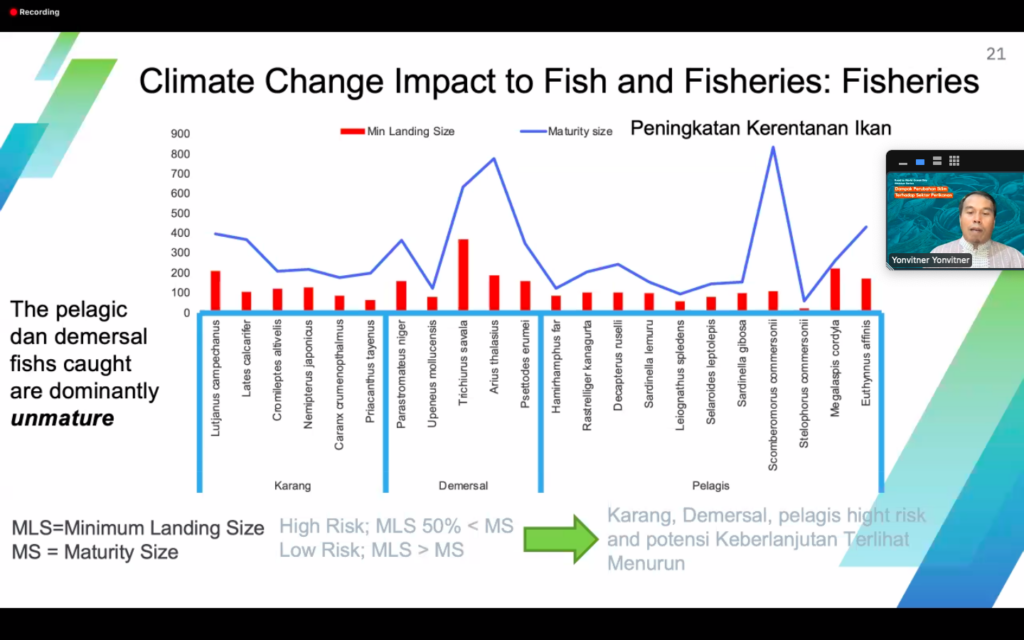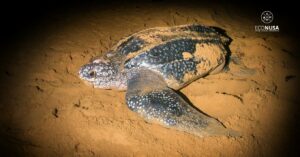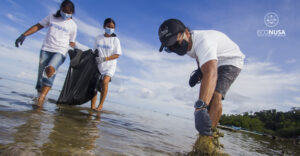
National Fisherman’s Day is dedicated to honor fishermen as food security heroes who have contributed greatly to the fulfilment of protein needs for all levels of Indonesian society. Unfortunately, the ongoing climate change crisis threatens the lives and welfare of fishermen and communities living on the coasts and small islands.
As felt by the fishermen in East Lombok. “In the past, we went to the fishing ground only five miles away. Now when sea catches are decreasing, we have to sail way further to Sumba seascape area,” said Amin Abdullah, Head of the Fisher Resource Development Institute, in a Webinar Series entitled “Impacts of Climate Change on the Fisheries Sector” held by EcoNusa to commemorate National Fisherman’s Day on Wednesday, April 6, 2022. This is the first event in a series of webinars leading up to World Ocean Day on June 8.
Read also: Efforts in Handling Plastic Waste in Maluku and Papua
According to Amin, the longer distance to find fish is due to climate change, which causes changes in ocean currents, waves, and winds, so that the fishing ground for fishermen moves and tends to be farther away. Climate change also causes the phenomenon of coral bleaching, thereby reducing fish populations. Not to mention the fish season has also become erratic.
“In the past, the fish season was sure, which lasted around five to six months. Now, you have to count the days in the catching phase. At least three to four days. After that, fishermen can’t get anything,” said Amin.
Yonvitner, an academic from the Bogor Agricultural Institute (IPB), explained that four variables of climate affect the life cycle of fish and fisheries, namely seawater temperature, rainfall, humidity, and wind. He also said that naturally the occurring climate change coupled with direct destructive human activities, such as marine pollution, mining, as well as illegal and destructive fishing activities, has caused massive damage to marine ecosystems. It starts from the destruction of coastal ecosystems, slow growth of mangroves, damage to seagrass ecosystems, and bleaching of the coral reefs, which lead to the decline of fish resources.
Read also: Microplastic and Plastic Waste Threatening Life
These various problems ultimately have an impact on the threatened welfare of coastal communities and increase the potential for coastal disasters such as tidal flooding, abrasion, and seepage of seawater into the coastal land (intrusion). It also leads to the decreasing level of biodiversity, causing disruption of food security, especially protein sources. “Our destructive habits have unknowingly led us to trouble in the end,” says Yonvitner.
In his presentation, Yonvitner also explained that the increasing seawater temperature causes the percentage of mature fish ready to spawn (gonad maturity) to decrease. Data shows that at a temperature of 30.09 degrees Celsius, fish that are ready to spawn are at 26.98 percent. Meanwhile, at a lower temperature, i.e. 28.27 degrees Celsius, the percentage of fish that had been gonad mature tended to be higher, namely 57.41 percent. This indicates that the increasing seawater temperature can disrupt fish’s reproduction and regeneration rate.
In addition, climate change also affects the distribution of fishery resources in the Indonesian seascape. According to Yonvitner, the phenomenon here is shown by the loss of the population of sardines (Sardinella sp) from the Bali Strait and the shifting of the fishing area for flying fish (Exocoetidae) from Sulawesi to West Papua.
Read also: Blue Ecomic Implementation Not Optimum
Viewed from the observations of the earth’s temperature that have been carried out since 1950, there has been a spike rise of global temperature which is predicted to pass the threshold. Based on a report by the Intergovernmental Panel on Climate Change (IPCC), human activities have so far caused the temperature in the atmosphere, sea, and land leading to the increase up to 1.1 degrees Celsius. If there are no mitigation and adaptation actions taken from now on, this can lead to various extreme climate disasters that will impact humans, especially fishermen, and coastal communities.
Various signs and impacts of climate change that are increasingly felt by the community, especially fishermen and coastal communities, of course, require adaptation and mitigation actions as viatal follow-ups to prevent disasters due to the alarming climate crisis. Therefore, the Government of Indonesia has taken several mitigation actions to deal with the climate crisis.
Alan Koropitan, the Expert of Deputy I for Maritime Affairs at the Presidential Staff Office, said that the government has a mitigation policy to cope with the climate crisis. In line with President Joko Widodo’s statement at the United Nations Climate Change Conference held in Glasgow, Scotland in 2021, the government will focus on rehabilitating the targeted 600,000 hectares of mangrove ecosystems spreading across several parts of Indonesia until 2024.
Read also: Measured Fishing Policy Overlooking Ecosystem and Fishers Welfare
“To meet this target, we need to do collaborative action from CSOs (civil society organizations), NGOs (non-governmental organizations), both from the national and international levels,” said Alan.
Climate change adaptation and mitigation are deemed collaborative efforts that need to be taken together, not only by the government and conservation organizations, but also by society as well. Collective action is needed to fight the climate crisis and shape the future for the preservation of Indonesia’s seas, the welfare of fishermen, and the prosperity of society in general.
Wiro Wirandi, EcoNusa’s Ocean Program Manager, said that seascapes in Eastern Indonesia are the last stronghold for marine biodiversity in Indonesia. More than half of Indonesia’s mangrove cover is in Papua. In addition, as many as 92 percent of reef fish are in the Bird’s Head Seascape or often called the kingdom of fish, covering the area of Raja Ampat, Cenderawasih Bay, Kaimana, to the Banda Sea. “Unfortunately, this wealth is threatened by the climate crisis, which requires immediate mitigation and adaptation measures,” said Wiro.
Editor: Leo Wahyudi & Nur Alfiyah







